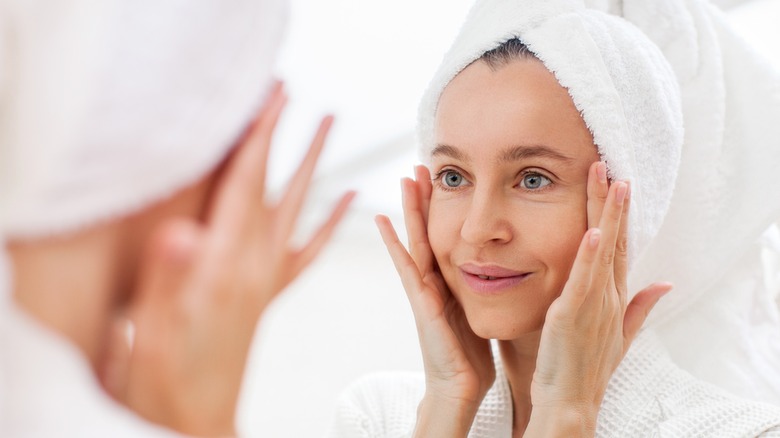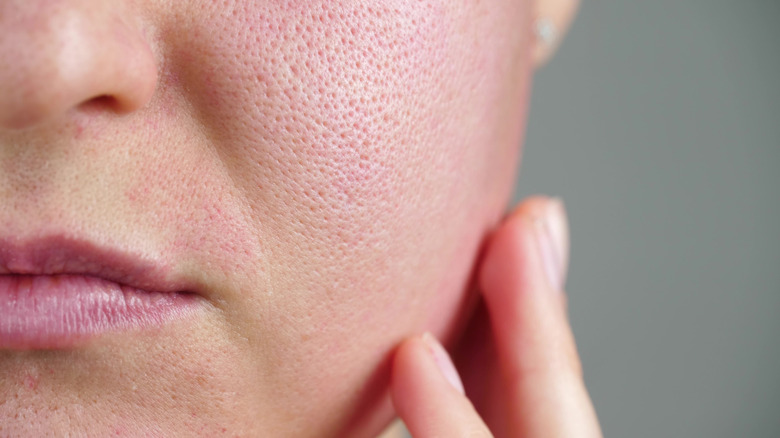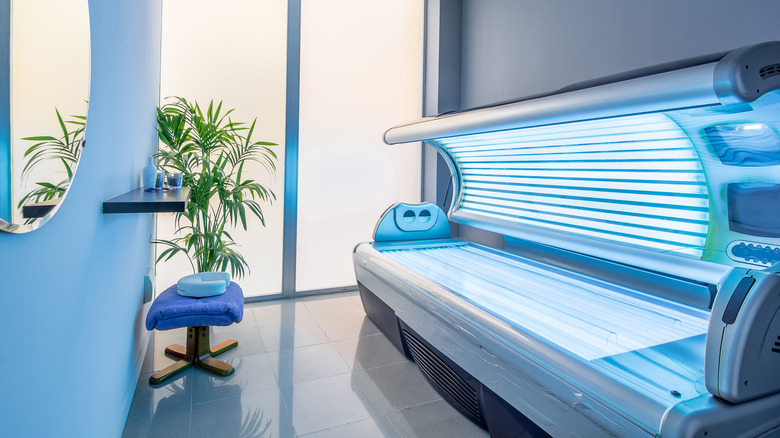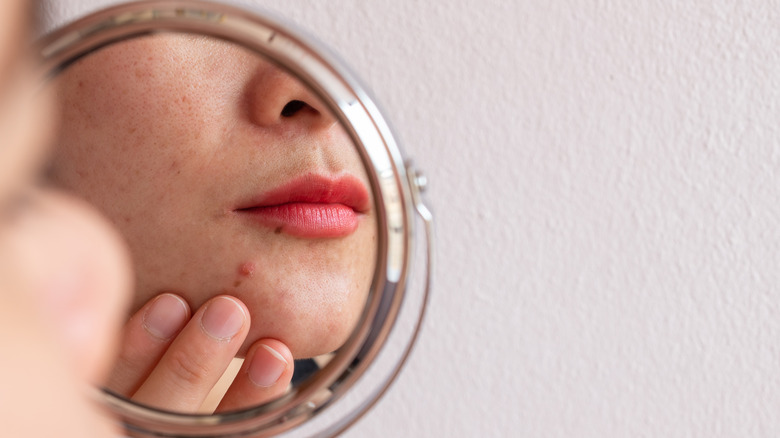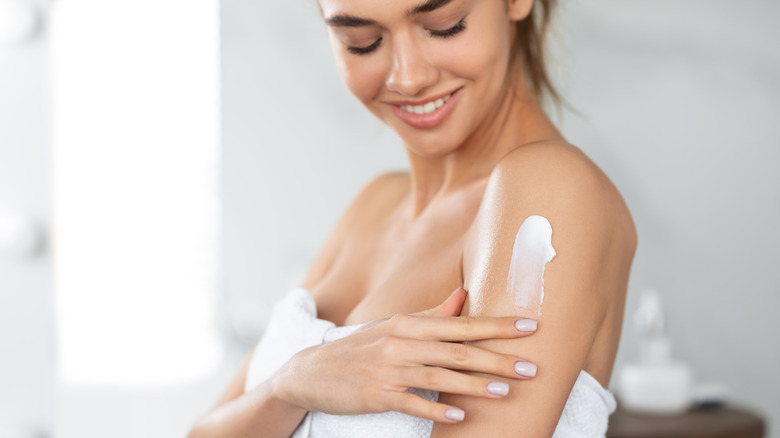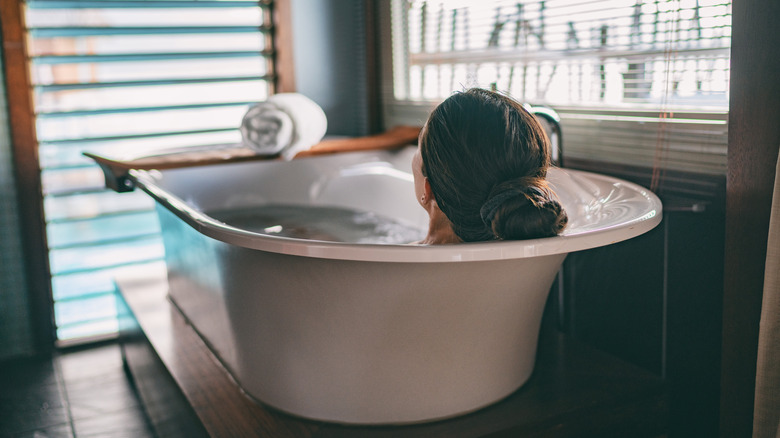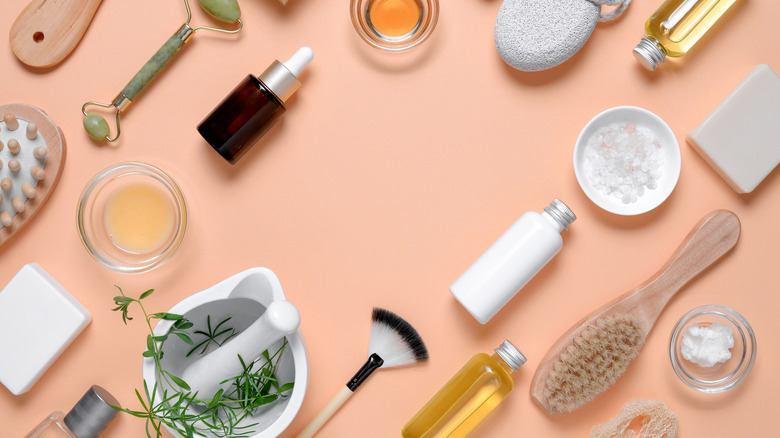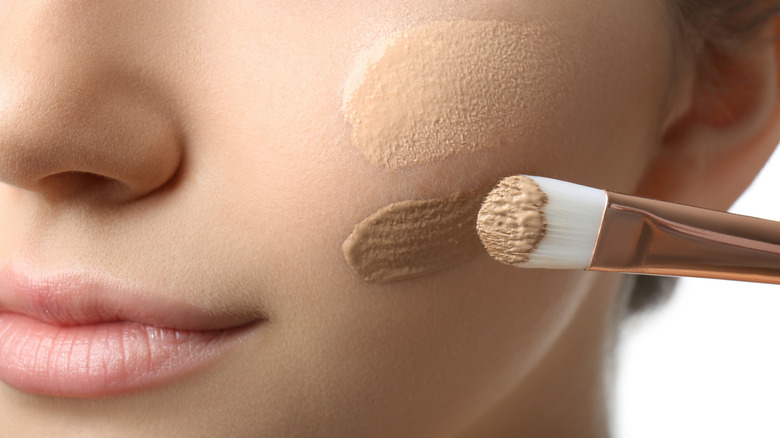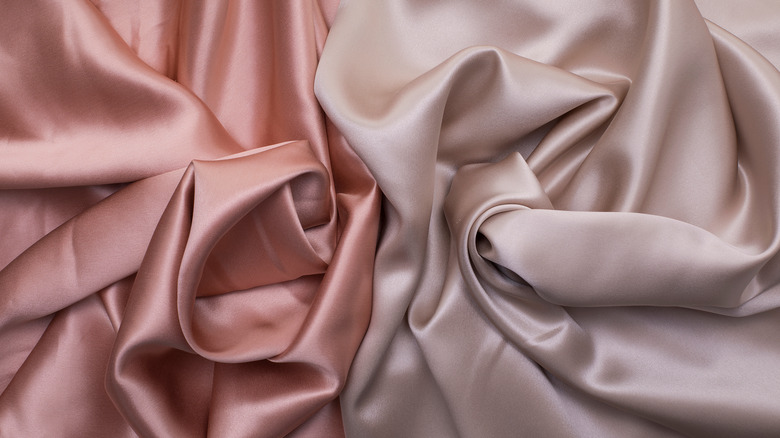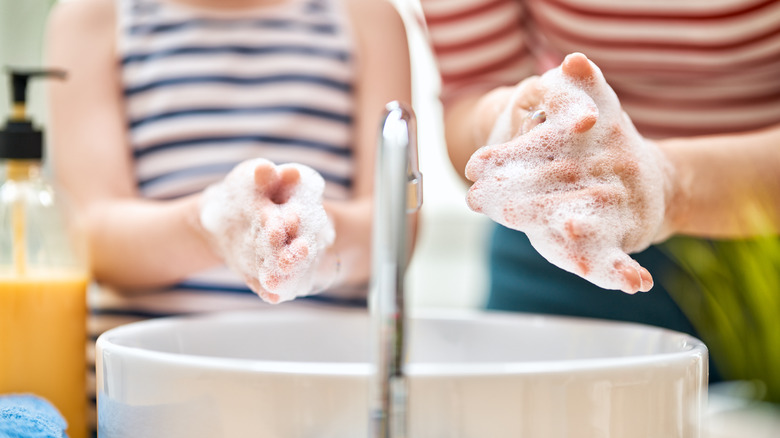Myths You Should Stop Believing About Your Skin
It's a sea of skin care marketing out there, and you may feel like you're drowning. From the influencers with flawless skin trying to sell you on their commissioned goods to countless new products emerging with claims to tighten this and brighten that, we often find ourselves buying into trend after trend in the pursuit of a supple, glowing complexion.
Compounded by stressing over every mole and wrinkle, wanting to be tan yet undamaged by the sun, and the pressure to prevent aging, the endless chase of perfect skin can cause your wallet and one of your most important organs to suffer. All of the new cutting-edge and sneakily marketed supposed miracle elixirs may be tempting, but before you dump dollars into the beauty industry's pocket, it's important to be aware of the skin care myths that might be leading you astray.
Believe it or not, these myths lurk around every corner in the beauty industry. From makeup to showers to sunscreen to soap, we've been deluded in more ways than one. Don't lose hope, though; here are some common skincare superstitions that are likely dimming your glow.
Myth: Skin pores open and close
Fact: pores don't have muscles, so they can't open or contract. Pore size is determined by a combination of genes, sun exposure, skin care habits, nicotine use, and age (via The Dermatology Specialists). We've all seen the products that purport pore-tightening or pore-closing benefits, or the claim that pores should be "opened up" to maximize product absorption, then rinsed with cold water to cinch them back up. Pores don't react to water temperatures to tighten, explains board-certified dermatologist Dr. Sapna Palep to skincare.com — while warm water can help in more effectively cleaning out pores, it doesn't open them. She says, "Hot water can change the structure of the skin, make it more pliable, and loosen up the material in it so it's more easily flushed out, which can make the pore appear smaller," says Dr. Palep. She warns against crossing the line from warm to hot, however: "Steaming or using water that's too hot can actually break down the proteins in the skin and make you more susceptible to eczema, breakouts and irritation."
When it comes to cold water, the answer gets a little more hazy. Dr. Palep explains that there is an involuntary muscle, part of the autonomic nervous system, that runs alongside hair follicles and next to pores on the face. These arrector pili muscles may contract in response to water, making what we know as goosebumps — and there's a chance this contraction may partially block your pores' openings, but it's not definite nor is it permanent.
Myth: Tanning beds are safer than sun tanning
According to expert, using tanning beds may actually be worse for you than basking in the sun. The desire for summery, sun-kissed skin has been around for decades, but the best (read: safest) way to obtain that evolved over the years. The tanning bed was first introduced in the 1970s (via Aqua Living Stores), and while use of this harmful practice has declined over the years, the American Academy of Dermatology (AAD) reports that nearly 8 million adults in the U.S. still choose to tan indoors.
Just as the sun does, tanning beds emit ultraviolet (UV) radiation, which is one ranked as one of the highest risk categories of carcinogens by the International Agency for Research on Cancer, according to a study published in BMC Public Health. This puts tanning beds at a high probability for causing skin cancer. But that's not where the risk stops, explains the Cleveland Clinic. Tanning beds may damage your vision and up your vulnerability to cataracts and cancer of the eyes, suppress your immune system, and accelerate signs of aging as the penetrative UV rays destroy precious collagen.
Is there any safe way to tan? Not in the true sense of the word, which is darkening of the skin through UV exposure. For a tanned look, University of Iowa Health Care recommends using quick- and self-tanning products instead. Unfortunately, the effect is temporary and the color will fade faster, but this seems a small price to pay for being less vulnerable to skin cancer.
Myth: Toothpaste helps clear zits
Sometimes all it takes to ruin your day is a big, painful zit squarely on the tip of the nose, and your mom might have told you to slather toothpaste on the blemish for an easy fix. But while there may be some anecdotes out there to support the idea that a dab of toothpaste will help clear up your acne, experts advise avoiding this old wives' tale and reaching for a product actually intended for treating acne.
Some toothpastes share a few active ingredients with acne treatments, but considering all of toothpastes' other purposes — tartar blasting, whitening, breath freshening — it also contains ingredients that may inflame or irritate the sensitive skin on your face (via Johns Hopkins Medicine). The American Academy of Dermatology says that toothpaste could also damage your skin's biological barrier, according to MedicineNet.
All in all, it's best if you keep your mouth and skin products separate. If you struggle with chronic acne, the Mayo Clinic recommends looking for over-the-counter products that include benzoyl peroxide, salicylic acid, alpha hydroxy acids, or sulfur to treat the blemishes.
Myth: Sunlight is an acne treatment
Chronic acne sufferers look for all kinds of solutions to their temperamental skin, and the idea behind sunbathing as a treatment is that the heat and light will dry up the oil in the skin and prevent buildup. However, Water's Edge Dermatology says that dehydrating skin this way will have greater negative consequences in the long run. "Sitting in the sun can make it seem like your acne is improving at first, but it leads to more breakouts later," explains Water's Edge advanced practice registered nurse Sydney VanHoose. She adds, "... After you've been in the sun, the epidermis starts to dry and thicken." The immediate results as your skin's oil dries up may be pleasing, but the body starts to produce even more oil to compensate for the loss, "and that can lead to more breakouts," says VanHoose.
The other, more obvious reason to not treat your zits with an afternoon of UV light is the risk of sun damage, skin cancer, and premature aging. Sunlight treatment of acne may be confused with the FDA-approved, dermatologist-backed blue light treatment — but this process kills bacteria on the skin without causing damage like UV rays do.
Myth: You don't need sunscreen if you're indoors
UV light will find you, even in your own home. If your sunscreen is a permanent resident of your beach bag, fish it out and keep it within easy reach, because experts say you should consider getting into the habit of daily application, regardless of if you're working in an indoor office, spending a lazy day on the couch, or even running errands on a gloomy, rainy day.
Even in your home, office, and car, the glass windows don't offer protection from all UV light (via the American Cancer Society). "Unfortunately, there is a lot of misinformation out there about the use of sunscreen, leading individuals to avoid its use," says dermatologist and professor of clinical dermatology Dr. Maria Teresa Ochoa with Keck Medicine of USC. According to Keck Medicine, most windows in your car are not treated to prevent UV light infiltration — only the windshield. A daily one-hour commute would mean two hours of sun exposure in your vehicle alone. In your home or office, some technology, particularly older televisions and computers, may emit some degree of UV light. From a day-to-day perspective, the consequences for not wearing sunscreen may seem minuscule, but the UV damage will add up in the long run.
Myth: Melanated skin doesn't require sun protection
The sun will damage any skin it can get its rays on, and because skin cancer diagnoses often happen at more advanced stages and with higher mortality rates in people of color, diligent skin protection is incredibly important (via Keck Medicine of USC). However, non-white American adults are less likely to use sun protection, according to a study published in Preventative Medicine Reports.
All skin colors contain melanocytes, the cell that produces melanin and gives skin its color, but darker skin tones produce more melanin, which can absorb more UV light before it damages the cell (via University of Virginia Health). On the other hand, visible sun damage — like a sunburn — may not appear on Black and Brown skin, meaning serious concerns and cancer warning signs may not be noticed until it's too late.
Dermatologist Dr. Darren Guffey with University of Virginia Health says that while skin cancer is more common in lighter skin, those with pigmented skin are at a greater risk to have fatal skin cancer because early alarm signals aren't present or go unnoticed, resulting in a later diagnosis. "If the skin's natural melanin pigment is comparable to the body's umbrella, wearing sunscreen can be likened to using that umbrella and wearing a raincoat," Dr. Guffey says. "No matter how good the umbrella, you'll end up less wet if you also wear a raincoat."
Myth: People with oily skin shouldn't moisturize
All skin types benefit from moisturization, no matter oily, dry, or combination (via IPSY). Just because you're lactose intolerant doesn't mean you wouldn't eat or drink anything, right? You'd just change the way you do so, and the same applies to moisturizing oily skin. While it may take some trial and error to find the perfect product for your unique skin, it does exist, even for the oily types.
When picking a moisturizer for oily skin, look for options labeled with non-comedogenic or oil-free (via PC Dermatology). These products may lead to less clogged pores and acne. Experts also recommend avoiding ointments, which are likely to be fat- or oil-based, and opting for a water-based lotion or gel moisturizer instead, finding a product that also contains a sunscreen of SPF 30 or higher. In addition, you should always apply your moisturizer to clean, damp skin.
You may be wondering why you need to hydrate your skin that already struggles with its moisture balance. PC Dermatology explains that this is a common misconception about moisturizers: Rather than adding moisture to your skin's microbiome, moisturizers actually help to retain hydration in your skin's outer layer.
Myth: Hot water doesn't impact your skin
Hot baths or showers may bring comfort on a blustery winter day, but high temperatures can actually be detrimental to your skin. The University of Pittsburgh Medical Center explains that soaking in a steamy bath, while known to have benefits like reducing stress and clearing nasal congestion, could also strip your skin of the natural oils, proteins, and fats that keep it hydrated and supple. A skin barrier without its hydration could lead to dry skin vulnerable to infection, redness and itching, and overproduction of oils.
Dermatologists recommend cool or lukewarm showers or baths to promote healthy skin and hair. If your skin is red during or after your shower, the water is too hot. Shortening your time in the water may also benefit your skin, so be sure to hop out before your fingers are pruned up. UPMC also says that reducing your bathing to every other day depending on your lifestyle may reduce the trauma caused to the skin by hot showers.
Myth: The more skincare products, the better
Beauty companies and influencers do their best to convince us that we need layers upon layers of products to achieve the healthiest skin, but expert dermatologists say that an excessive 10-step skincare routine is unnecessary and may even be setting your skin back. Unloading your entire medicine cabinet on your skin can lead to over-exfoliation, irritation, sensitivity, or aggravation of acne. "Too much of a good thing — like over-exfoliating your skin with multiple acids and/or mechanical beads — can result in redness, irritation, dryness, and worsened breakouts," dermatologist Dr. Jeanette Graf tells Insider. "With so many skin care choices available, patients often overuse or combine products, which can worsen their skin."
How can using too much of something meant to help your skin actually harm your skin? Usually, it's combining active ingredients that aren't meant to work simultaneously. Sometimes the consequence is minimal — like an acidic product being applied over a basic one, rendering them useless — but sometimes these concoctions can damage your moisture barrier and lead to vulnerable, sensitive skin.
There are some products that don't do well with any other active products — such as retinols and retinoids, which don't play well with alpha hydroxy acids (AHAs), benzoyl peroxide, salicylic acid, or vitamin C — but a good general rule to start with is never using two products with the same active ingredients. If your face feels greasy, sticky, or tacky after your skincare regimen, you may have used too many products, or the wrong products.
Myth: Makeup SPF is enough to protect your skin
Dermatologists recommend applying sunscreen regardless of whether your makeup has a sun protection factor, or SPF (via Makeup.com). This is because makeup with SPF must be applied in certain quantities — roughly 2 milligrams per square centimeter of skin — to reach the marketed level of SPF protection. This is far more makeup than most wearers need or want – about a shot glass worth of product.
Additionally, experts say you should reapply sunscreen every two hours, especially if you work outside (via Johns Hopkins Medicine). A shot glass full of makeup every day, multiple times a day, would be excessive and pricey, and a huge hassle when using tinted products. Applying sunscreen before your makeup will help you reach the necessary SPF without caking on makeup products. Added protection from SPF makeup will never be a bad idea, however. The makeup gurus over at Byrdie recommend foundation from Shiseido, SPF lip balm from Fresh, and primer from Laura Mercier, just to name a few.
Myth: The material you're sleeping on doesn't matter
If you are battling acne-prone skin, the quality and material of your pillowcases and sheets can contribute to your skin's health, Water's Edge Dermatology says. Several common bedding materials like cotton, microfiber, polyester, and hemp can irritate and exacerbate acne because they soak up and retains your skin's oils, bacteria, allergens, and dirt. In addition, they can leech your nighttime skin care products off your face because of their high absorbency.
You can wash your bedding every couple of days to prevent the havoc wreaked on your skin, but dermatologists recommend switching to a smooth, less abrasive material, like silk, bamboo, or satin, at least for pillowcases, because "acne lesions are inflammatory in nature to begin with," according to Water's Edge dermatology expert Sydney VanHoose. She adds, "Irritation from rough fabrics can further inflame acne lesions and exacerbate breakouts."
Authentic, quality silk and bamboo can be expensive, and synthetic satin, while more affordable, may contain polyester or other absorbent materials, so if these materials are out of your budget, VanHoose recommends washing or changing your existing pillowcases every two or three days. You can also try misting your pillow with natural antibacterials like lavender or tea tree, and stay diligent about washing your face before bed to discourage bacteria and oil buildup.
Myth: Antibacterial soap is best for keeping your skin clean
There's no evidence suggesting that antibacterial soap is any better in preventing bacteria from living on your skin than regular soap. The U.S. Food and Drug Administration (FDA) says that no science has backed the claims that antibacterial hand soaps are more effective. The FDA even recently ruled that consumer antiseptic products, from body washes to bar soaps to hand soaps, can no longer be marketed as antibacterial, even if they contain certain antibacterial active ingredients — and this is because no manufacturers of antibacterial soap have been able to prove that their products are better at preventing illness and spread of disease than water and plain old soap. Because the new rule restricts 19 out of 22 used antibacterial active ingredients, as more manufacturers become compliant with the FDA ruling, products with "antibacterial" emblazoned on their label will likely dwindle in popularity.
Dr. Theresa M. Michele of the FDA Division of Nonprescription Drug Products says that antibacterial products give consumers a false sense of security: "If you use these products because you think they protect you more than soap and water, that's not correct. If you use them because of how they feel, there are many other products that have similar formulations but won't expose your family to unnecessary chemicals." So how do you best stay clean? Just wash with your favorite plain soap and be disciplined in regularly doing so, Dr. Michele says. "It's simple, and it works."

